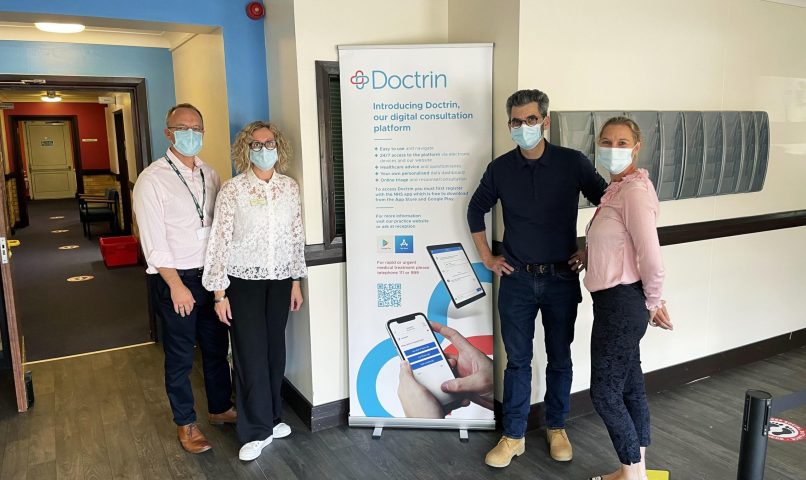
Capturing the Patient’s Story Is Fundamental for all Digi-Physical Care
The patient report is the foundation of most medical assessments. The process of taking the patient history is used internationally across different specialities and professions but the methods have evolved to create a more person-centred consultation. Today, there is greater emphasis on the patient actively participating in the process because this engagement is found to give a more enriched information base for the consultation and increases compliance with management plans. As healthcare becomes increasingly digital, how can we combine the advantages of accepted methods with the benefits of digital tools to create a medical history report which is safe and person-centred and ensure that the information collected is sufficient and appropriate to allow the care staff’s skill and expertise to effectively assess the patient’s presentation while still capturing all the nuances of the patient’s story?
Medical Content for Digi-physical Care
Doctrin’s medical team, which consists of specialists in general, internal medicine and paediatrics, has devoted more than 20,000 hours to develop the medical forms that make up our automatic medical history report engine. Doctrin Source contains over 600 situation-adapted questionnaires designed for various medical areas of primary care, dental care and specialist care. In addition to questionnaires designed for when the patient contacts to access care, Doctrin also offers follow-up questionnaires for the care provider to use. Being able to contact the patient digitally in a secure way is far more efficient than sending invites and test results via letter saving time and money. . Healthcare professionals can also use watchful waiting to monitor a condition safely, which enables more appropriate use of , for example, antibiotics and other types of treatment.
Our medical history report engine also contains about 50 administrative questionnaires to facilitate the collection of patient responses to questions about referrals, requests for follow-up and certificates of various kinds. It also provides standardised checklists and protocols such as questionnaires for Covid-19 vaccination and various types of health declarations.
Person-Centred Digital Medical History Report
The automatic medical history report is dynamic. Just as a doctor or nurse would adapt their questions based on the patient’s answers, our dynamic questionnaires are designed to adapt to the gender, age, and previous answers to get a relevant basis. In the same way that modern consultation methods are about exploring the patient’s needs through open-ended questions and confirming the patient’s experience then summarising to clarify and confirm to the patient that a medical consultant has understood and captured their story, we try to emulate the same steps in a digital context.
The digital medical history report corresponds to the open question where the patient can express their needs without interruption. In addition to the questions related to symptoms, the patient can also fill in free text questions to capture their perceptions, fears and expectations.
In a traditional consultation, it is usually recommended that the caregiver should allow two to three minutes for the patient’s part of the medical history report. In our digital forms, the patient spends an average of eight minutes filling in the questionnaire. Since the patient fills in the medical history report, there are no restrictions on how long the patient can spend n filling it in. Caregivers also testify that it is often in the free text questions that the care staff can extract what the patient is anxious about. It is thcollection of this information that enables an engaged and insightful response even in digital contact.
Since the patient story is automatically compiled into a clearly laid out report, it is easy for the care staff to confirm with the patient in the consultation, whether it is physical or digital, that they have read the patient’s story and check they have understood it correctly. Since the patient is given the opportunity to assess their experience after each digital care contact, the care staff also receive direct feedback if the patient feels that they have received the information they need and is satisfied with the management plan and treatment .
In a time-limited meeting with physical care, because of the need to prioritise issues there is a risk of avoiding background problems such as smoking, drugs and alcohol but with a digital medical history report this is standardised so ensuring that all relevant background problems are covered. The digital medical history report will also be independent of preconceptions, bias and prejudice, which in a physical consultation can affect which questions are asked or not asked.
Medical Content that Increases in Value Over Time
Two critical principles underlie the automatic medical history report engine. Firstly, to produce medical history report’s of high quality, value and effectiveness. To do this the questionnaires must be comprehensive, appropriate to the patients situation contain all of the information needed to make the right decision in a short amount of time and comfortable for the healthcare professional to follow and understand. ,It provides safer, more efficient care contacts that free up time for care staff to direct into what matters to the patient, whether that is about responding to the patient’s concerns or discussing lifestyle changes.
The second principle is that the forms and the data structure must be designed so that they accumulate increasing value over time. The insights that become possible by making business data available in real time can allow each business to take ownership of its own continuous business development by becoming data-driven and reading patient behaviours at an aggregate level. We also design our questionnaires and structure the data, to take into account how the maturity of technology will enable an increasingly sophisticated use of the data.
An example of this is that our customers mark each patient case with the final care level, which means that we can follow the pathway of each case through the care system. Thanks to outcome annotation and artificial intelligence (AI) in the form of machine learning (ML), we will, in the long run, be able to use the data to increase the precision in decision support for, for example, triage.
Medically Validated and Evidence-Based Process
Every month, our medical team creates an average of 20 new medical questionnaires in response to our customers’ needs and changes in healthcare and science direction. The forms are created in a medically validated process, based on evidence-based sources of knowledge, where we apply the international standard IEC 62304 for medical technology software that we have adapted so that it is suitable for the medical production content. Our medical experts are gradually improving the forms. The improvements are partly based on feedback from caregivers, staff and patients. We also start from user data, for example, how long it takes to fill in a form, the number of skipped questions, and the proportion of interrupted medical history reports, giving us a clear picture of each form’s user-friendliness. We also develop questionnaires as new knowledge is published; a concrete example is Covid-19, where knowledge about symptoms increased as the virus spread since the spring of 2020.
Dynamed Plus, Medibas and, where appropriate, national and regional knowledge support such as National Clinical Knowledge Support, Viss.nu, Stramas, the Swedish Public Health Agency, the National Board of Health and Welfare and the Medical Products Agency’s guidelines are used as underlying knowledge support.
We also use fictitious patient cases as authentic testing of the forms to ensure usability and patient safety. This is to create a development environment that is as close to real care as possible. Hence, we get questionnaires that combine the accepted way of doing medical history reports with the benefits of digitalisation in standardisation and data management. The result is a person-centred and patient-safe history that enables an efficient flow of care.
To know more about our solutions for digi-physical heathcare please contact Craig Oates, UK Country Manager Doctrin



